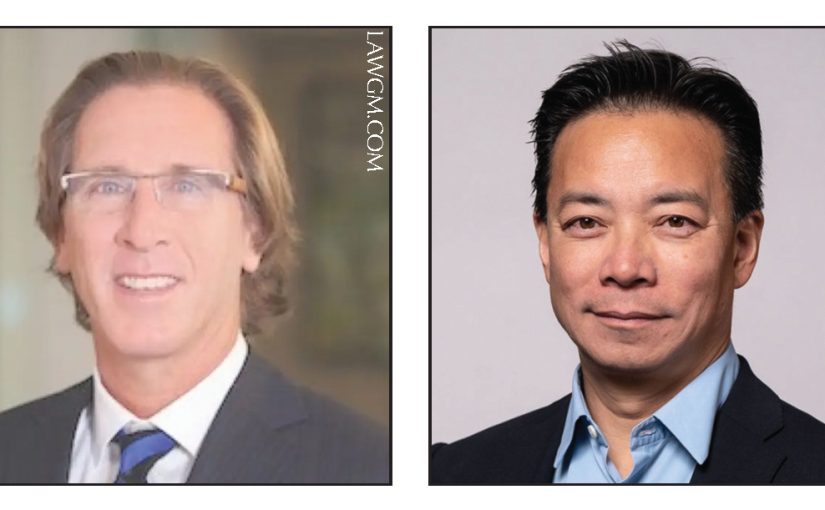At the daylong legal seminar being held at Congregation Beth Israel on Feb. 15, Howard Mickelson, KC, and Vancouver Mayor Ken Sim discuss the legal implications of adopting the IHRA definition of antisemitism. Mickelson, left, spearheaded the event.
Congregation Beth Israel will be holding a full-day seminar, titled The Legality of Combatting Antisemitism, on Feb. 15. Topics will include defining antisemitism, combatting and addressing antisemitism on campus and in the workplace, examining the Charter implications of fighting antisemitism and the constitutional implications.
“Attendees can expect a top-notch group of speakers providing legal insight on, and addressing, a critical issue of our current troubled times,” said Howard Mickelson, KC, of Gudmundseth Mickelson LLP, who is spearheading the seminar. Mickelson has been a lawyer for more than 30 years.
The daylong event takes place four months after the Hamas attacks on Israel that killed approximately 1,200 people and saw about 240 people taken hostage. More than 130 hostages are still in captivity, with at least 32 believed dead. Since Oct. 7, there has been a dramatic rise in hate crimes in Vancouver, as well as the rest of Canada. A disproportionate number of these crimes have targeted Jews.
According to information released by the Vancouver Police Department (VPD) on Jan. 16, tensions from the Israel-Hamas war have fueled increases in protest activity and hate crimes in the city. Of the 47 antisemitic hate incidents reported to VPD in 2023, 33 occurred after Oct.7. In all, antisemitic incidents increased 62% in 2023 compared to 2022, when there were 29 incidents reported.
“The topic of the seminar is a result of the rise after Oct. 7 of antisemitism,” Mickelson told the Independent.
Mickelson, along with Vancouver Mayor Ken Sim, will discuss the legal implications of adopting the International Holocaust Remembrance Alliance (IHRA) definition of antisemitism. Sim promised during his 2022 mayoral campaign to push for the adoption of the IHRA definition by the city and Vancouver city council voted for the definition shortly after he assumed office.
In 2016, the IHRA created a non-legally binding definition of antisemitism, which reads: “Antisemitism is a certain perception of Jews, which may be expressed as hatred toward Jews. Rhetorical and physical manifestations of antisemitism are directed toward Jewish or non-Jewish individuals and/or their property, toward Jewish community institutions and religious facilities.”
Jewish groups are hoping that other jurisdictions, such as the provincial government, will follow Vancouver’s lead. In June 2022, former British Columbia Premier John Horgan issued his support of the definition in a letter. His successor, David Eby, has made several statements confronting antisemitism but his government has yet to adopt the definition. The federal government has adopted it, as have the provinces of Ontario, Alberta, Saskatchewan, Manitoba, New Brunswick and Newfoundland and Labrador.
Rob Phillip, executive director of Hillel BC, Beth Israel’s Rabbi Jonathan Infeld and Dr. Jay Eidelman, PhD, who is a professor in the history department at University of British Columbia, will present the seminar’s opening session, What is Antisemitism?
Russell Brown, who served on the Supreme Court of Canada from 2015 to 2023, will focus on the Charter implications of combating antisemitism. Prior to his appointment to the Supreme Court, he was an associate professor and associate dean at the University of Alberta faculty of law and is the author or co-author of numerous legal works.
On the topic of Combating Antisemitism on Campus, one of the scheduled speakers is Prof. Cristie Ford of the Peter A. Allard School of Law at UBC. Colleges and universities across the province and the country have witnessed a sharp uptick in antisemitic incidents over the past four months. Jewish students have reported feeling unsafe on several campuses due to anti-Israel rhetoric and hostile behaviour from other students, as well as faculty.
The session Addressing Antisemitism in the Workplace is a roundtable moderated by Claire E. Hunter, KC. It features Reut Amit of Southern Butler Price LLP, Erin Brandt of PortaLaw and Abigail Cheung of Harris & Co.
The final topic, Mooting the Constitutional Implications, will be taken on by Marshall Rothstein, CC, KC, Osler Russell Brown; S. David Frankel, KC; Geoffrey Cowper, KC, Fasken; and Greg Allen, Allen/McMillan.
About the seminar as a whole, Mickelson said attendees can expect “legal guidance in a variety of areas, such as employment, campus life and criminal law, to deal with the heightened levels of antisemitism post-Oct 7.
“It is, of course, highly distressing to our community and especially our children,” he added. “As a lawyer, this is the best way I and the others assisting me on this, particularly Claire Hunter, KC, can do something constructive and educational to feel less helpless.”
Mickelson noted that Congregation Beth Israel has put on other topical daylong continuing legal education seminars, with assistance and insight from Infeld, including two separate trips to Israel with members of the bench and bar.
The cost for the Feb. 15 seminar, which runs 8:30 a.m. to 4:30 p.m., is $360 for professionals and $180 for students. Breakfast, snacks and lunch are included. The event is worth six continuing professional development (CPD) credits, including two ethics credits. For more information, visit bethisrael.ca or write info@bethisrael.ca.
Sam Margolis has written for the Globe and Mail, the National Post, UPI and MSNBC.

